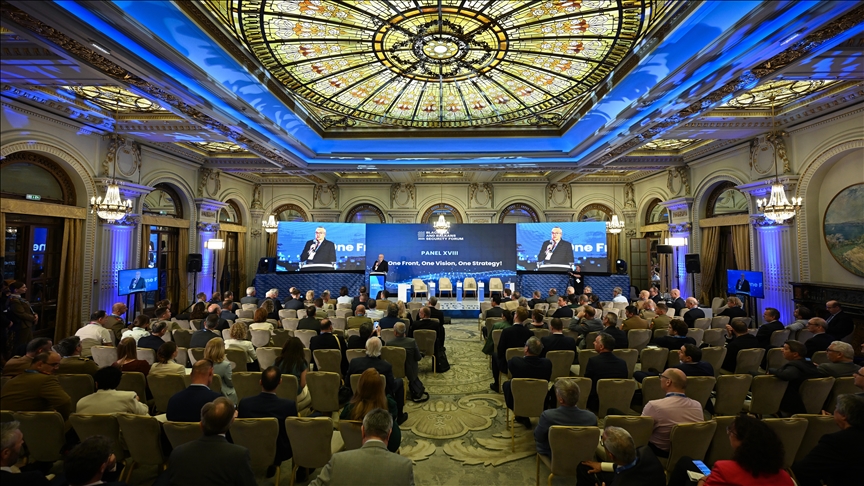Black Sea and Balkans Security Forum ends with focus on future of region, AI warfare, European security
Forum's 2nd day opens with defense officials from Türkiye, Romania, Bulgaria, Moldova examining persistent threats in Black Sea region
 A general view of the hall as the ninth Black Sea and Balkans Security Forum concluded after two days of discussions on the region's future, the impact of artificial intelligence on warfare, and the evolving European security landscape in Bucharest, Romania on May 23, 2025.
A general view of the hall as the ninth Black Sea and Balkans Security Forum concluded after two days of discussions on the region's future, the impact of artificial intelligence on warfare, and the evolving European security landscape in Bucharest, Romania on May 23, 2025.
BUCHAREST, Romania
The ninth Black Sea and Balkans Security Forum concluded Friday in Bucharest after two days of intensive discussions examining the region's future, artificial intelligence's impact on warfare, and evolving European security architecture amid ongoing geopolitical challenges.
The forum's second day opened with defense ministers from Romania, Bulgaria, and Moldova, along with Turkish Deputy Defense Minister Suay Alpay, examining persistent threats in the Black Sea region. Alpay emphasized cooperation among littoral states while warning that military escalation in the region could heighten tensions.
Subsequent panels explored the Danube River's strategic importance for European security and NATO's efforts to maintain open seas. In a separate session, foreign ministers from Romania, Bulgaria, and Moldova, alongside Atlantic Council expert Ian Brzezinski, examined the challenges facing maritime freedom along NATO's eastern borders.
AI transforming modern warfare
Artificial intelligence's impact on military operations was also discussed. Former military officials and experts discussed AI's expanding role in warfare, ethical concerns surrounding autonomous systems, and critical requirements for human oversight in the decision-making processes.
Panels addressed future warfare scenarios involving robots, drones, and satellites and examined cybersecurity vulnerabilities and cognitive warfare in the AI era.
European security architecture
European security framework discussions dominated multiple sessions, with experts debating whether Europe should pursue greater strategic autonomy or strengthen transatlantic partnerships. Participants examined what Europeans can offer to maintain US engagement in European affairs and whether the EU will emerge as an independent security actor.
Panels questioned NATO's future trajectory, exploring how the alliance can adapt to shifting geopolitical dynamics while maintaining cohesion among member states amid Washington's strategic pivot.
Russian hybrid threats, deterrence
Extensive attention focused on Russia's unconventional warfare tactics, including weaponization of migration and ongoing hybrid threats Moldova faces. Experts analyzed post-war Russia scenarios and nuclear deterrence effectiveness.
Global interconnected challenges
The forum addressed broader geopolitical issues, including food weaponization affecting global supply chains and intensifying great power competition spanning from Asia to Europe. Balkans stability and strategic corridor development also featured prominently in discussions.
George Scutaru, CEO of the New Strategy Center, and Nicolas Warnery, ambassador of France to Romania made the closing remarks. Warnery expressed gratitude for being the partner country of the organization. Scutaru summarized the two days of the forum in his speech and thanked the participants.
The two-day event, organized by Romania's New Strategy Center with Turkish news agency Anadolu as the global communication partner, brought together nearly 200 speakers to address long-term regional security challenges and emerging threats.
Anadolu Agency website contains only a portion of the news stories offered to subscribers in the AA News Broadcasting System (HAS), and in summarized form. Please contact us for subscription options.







